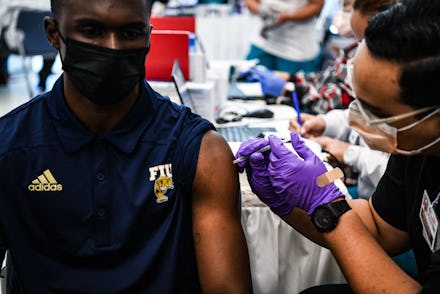Pfizer's CEO just admitted we'll all probably have to get a 3rd coronavirus shot

At this point, nearly 200 million coronavirus vaccine doses have been administered by the United States government since the start of the COVID-19 pandemic more than a year ago. To be sure, there have been some bumps in the road toward full inoculation (Johnson & Johnson, I'm looking at you here), but by and large the speed and efficacy with which the nationwide vaccination program was created and put into motion has been an astonishing achievement.
Now, with around 3 in 10 Americans already jabbed (ideologically malignant holdouts notwithstanding), the country is headed toward something resembling what we might have at one point considered "normal" ... at least, until we have to do this all over again about a year from now.
That, according to Pfizer CEO Albert Bourla, is the likely next step.
"It is extremely important to suppress the pool of people that can be susceptible to the virus," Bourla told CNBC's Bertha Coombs earlier this month, in comments made public Thursday. To do so, Bourla explained, it's "likely" people will need a third COVID vaccine shot, and possibly even accept the necessity of annual inoculations, similar to flu shots.
Bourla's comments, made during a CVS Health event on April 1, dovetailed perfectly with testimony given to the House Select Subcommittee on the Coronavirus Crisis by Dr. David Kessler, the Biden administration's chief science official on its COVID response team.
Speaking before the committee Thursday, Kessler also stressed that a third dose — if not more — might be necessary to contain the coronavirus pandemic in the future, particularly given open questions surrounding the length of the inoculations' efficacy and how current vaccines will fare against future mutations of the virus.
"I think we should expect that we may have to boost," Kessler told Rep. Nydia Velazquez (D-N.Y.), during his testimony.
What future COVID vaccines might look like — and who might pay for them — remains entirely to be seen. While it's still possible that the existing suite of coronavirus medications from Pfizer, Moderna, and Johnson & Johnson will be enough to keep the pandemic from raging as it did over the past year, the next phase of our coronavirus existence might just as likely be simply accepting that, like the flu, COVID-19 is part of our daily lives from here on out.